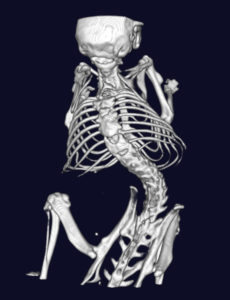
Myosins are proteins essential for fundamental cellular functions such as in cell division, transport and migration. A unique set of myosin proteins are expressed by our skeletal muscle, which form part of the contractile network helping movement and posture maintenance. One such myosin is myosin heavy chain-embryonic (MyHC-embryonic), encoded by the Myh3 gene, which is expressed during embryonic development and mostly absent in the adult muscle except during injury and associated regeneration. Mutations in MYH3 have been found to lead to several congenital musculoskeletal disorders such as Freeman Sheldon Syndrome, Spondylocarpotarsal Synostosis (SCTS) etc.
In this study, using a mouse knockout for Myh3, we characterize the adult musculoskeletal defects exhibited at the structural and functional level. We find that loss of MyHC-embryonic results in reduced muscle weight, myofiber size and grip strength, in addition to scoliosis and vertebral fusion, typical of SCTS. Thus, we report the first mouse model for the MYH3-loss of function associated SCTS, which recapitulates characteristics of the human syndrome. Myh3 knockout mice also exhibit changes in muscle fiber type, muscle stem cell numbers and increased muscle fibrosis. At the molecular level, Myh3 knockout mice exhibit altered mechanical signals, leading to elevated signalling through the mechanoresponsive Yes-associated protein (YAP) transcriptional regulator. An inhibitor of YAP signalling rescues the musculoskeletal defects exhibited by Myh3 knockout mice, indicating that YAP could be a promising therapeutic target to treat SCTS and other MYH3-associated congenital musculoskeletal diseases.
Bharadwaj A*, Sharma J*, Singh J, Kumari M, Dargara T, Kalita B, and Mathew, SJ. (2023). Musculoskeletal defects associated with myosin heavy chain-embryonic loss of function are mediated by the YAP signaling pathway. EMBO Molecular Medicine 15(9):e17187. doi: 10.15252/emmm.202217187. (Journal Cover Image)
Study covered by India Bioscience: https://indiabioscience.org/news/2023/a-new-mouse-model-to-study-musculoskeletal-genetic-disorders
Image legend:
Micro-CT image of Myh3 knockout mouse exhibiting scoliosis (journal cover picture)

